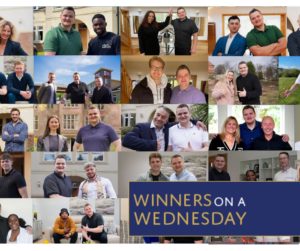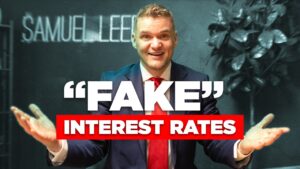The cost of the pandemic to the country and the effect on the economy made care worker Leo May fear for his financial security. So, he purchased a buy-to-let, using the equity in his flat to acquire a cash-producing asset which would protect him against inflation. Now, after joining Samuel Leeds’ academy, Leo has four properties and is financially independent. One is his home. The other three are rented out as serviced accommodation. Leo is also poised to take on a bed and breakfast in a joint venture with his partner.
‘My family thought I was nuts to go into debt’

Every time Leo’s phone pings it signals another booking for one of his furnished properties. His partner receives the same alert. He set her up as a co-host so that she could see his strategy was working and it would encourage her to come on board with him.
Like her, Leo’s friends and family needed convincing when he decided to go into property as a business two years ago.
It was during the Covid outbreak that Leo found himself in a quandary. He had already paid off the mortgage on his flat, having worked hard for many years. So, from that point of view he was comfortable. He was worried, however, about the state of the nation’s finances.
“It was frustrating. I didn’t know what to do. You can’t pay a country for two years with the economy not tanking. I was really frightened for that.”
All his working life Leo had seen that property overall tended to go up. His eyes had also been opened to the power of leverage. In real estate terms, this was using other people’s money to acquire a second property that would give him an income.
“There’s that saying, safe as houses. Sometimes it goes up. Sometimes it goes down. But the important thing was to get something out there and try to hedge against inflation.”
That was his fear and the rationale behind his decision to take on debt again, he explains.
After being inspired by Samuel Leeds’ YouTube videos on property investing, Leo took the plunge and remortgaged his flat to release the equity from it.
“That was the way I got some money. I was able to put that on a deposit for my first bog-standard, safe buy-to-let. I didn’t really know what I was doing. Lots of people and family around me thought I was nuts.
“They said, ‘What are you doing? You’re mortgage free. I said yes, I could remain mortgage free, but I’d still have to work until virtually the day I die just to keep up with the cost of living.”
From seeing that his buy-to-let worked, Leo went along to a £1 Property Investors Crash Course which he describes as a unique experience. Suddenly he was bombarded with new ideas.
Everything he had been taught about finance was turned on its head by Property Investors’ multi-millionaire founder Samuel Leeds who was leading the event. Samuel was saying to his audience they shouldn’t necessarily buy a house to live in, and if they did, not to pay off the mortgage.
This was the opposite of what Leo had been led to believe was best, which was to study hard, get a good job and work his way up the ladder until retirement. By saving some of his earnings he could buy a house and eventually rid himself of his mortgage.
“That’s what we’ve all been taught in the system. Nobody is saying there is anything wrong with that. But when you have had a lifetime of that, and that has been the environment you’ve lived your whole life with, that is quite a lot of baggage to try to unlearn.”
He attended another crash course to soak up all the information and then enrolled on the Property Investors Academy.
“I thought if I can pay that money [for training] and in a year be financially free – by that I mean earning at least the same as my day job – what would that be worth to me? What difference would that make to my life? Otherwise, I’m going to be still working until I’m 67.”
Having owned businesses before on the retail side, Leo was confident he could have a ‘crack’ at it.
Initially, he didn’t tell his partner he had joined the academy, although his enthusiasm started to give him away.
“Suddenly the people around me thought what’s happened to Leo. He’s just got obsessed with property all the time. It was almost as if there was something wrong with me which there probably was. I was thinking I’ve got to do something because the storm’s coming.”
His plan originally was to acquire more buy-to-lets. However, it soon became apparent to him that there were other methods of boosting his rent.
“You could just have a standard buy-to-let and it would work, but there are other ways you can get a super rent, as Samuel calls it.”
One of those options, he learnt, was serviced accommodation which was the strategy he made up his mind to pursue.
‘You either pay to learn or pay for what you don’t know’
Typically, a furnished apartment or a house is rented out through sites like Airbnb and booking.com with guests staying a night or two, but it can also be for longer, says Leo.
“I’ve just had some people in, and they’ve stayed for two months at a much higher rate. So, there are ways that you can multiply that income. That’s the thing that has got me to the stage where I’m technically financially free.
“It’s a real buzz. I love doing it and from my family and friends thinking I’m some kind of fruitcake they’re now looking at it, thinking oh my gosh this thing works.
“It can pretty much work anywhere where there are people, so long as you’ve got a fair amount of people around.”
He makes the point too that it is not just holidaymakers who book up such accommodation.
“You could have contractors, people visiting relatives. There is a whole range of reasons why people might come and stay.”
His portfolio is now giving him a passive income equivalent to a full-time salary, he says, which has persuaded his partner to consider going into business with him on a B&B. One option is for her to also remortgage her home to raise the required funds.
After working out their numbers and double checking them, they estimate the ‘worst-case scenario’ is that it will net £3,000 a month which would easily cover the mortgage payments.
“Together with what I’m doing that’s a life-changing situation for us, for something that so far we enjoy doing.”
It is important to distinguish between good and bad debt, he emphasises. “Good debt is an asset that produces an income. Bad debt is something you’ve got which you’re paying out on and it’s just draining away.
“You’ve got to be responsible. There’s a saying it takes a sprat to catch a mackerel. If you have to remortgage your house, don’t do it to buy a holiday or get a car. That’s not the idea. But if you refinance your house and the thing that you bought you can rent out, and it’s paying you back the mortgage plus £1,000, suddenly you’ve got that extra finance.”
His dealings have not all been trouble-free. He came close to coming ‘unstuck’ with his last acquisition. Three mortgage offers expired before the purchase could be completed. His solution was to take out a bridging loan, but it took time and tenacity.
“You have to know what you’re doing. But also, you can’t rely on solicitors or accountants or anybody else. Often it does come to you to shovel it over the line literally.”
In the middle of buying the property, there was a change of government and a mini budget which caused havoc in the markets, leading to rising mortgage rates.
Leo managed to refinance the property, but it affected his bottom line. “The rental is just about covering things but nothing like it would have.”
The upside was that he was able to pull out most of the deposit. Having bought the property for £140,000, he spent about £2,500 refurbishing it. The end value after the work was finished was £180,000.
“I refinanced it and was able to pull out about £24,000. I left about £11,000 in. Suddenly you’ve got a property that’s actually cost you £11,000. Yes, there’s a mortgage on it but if the mortgage is being paid for by the tenant you’ve acquired an asset, a property that over time is likely to increase and you have control of it.”
Currently there is a tenant in the property, but it may be turned into serviced accommodation at some point.
The introduction of Section 24, which means landlords have to pay tax on their gross income, caught him out. Had Leo bought all of his rental properties through a company, he would have been able to offset his mortgage payments and costs against his tax bill.
“Because I didn’t know what I was doing in the early days some of mine aren’t in a company. I’m paying for what I didn’t know. We all end up paying something one way or another. You either pay to learn, or you’re going to pay over a period of time with what you don’t know.”
‘I spend one to two hours a week managing my properties’
Leo, who looks after adults with learning disabilities and dementia, recently got a promotion and is still working full time. He can combine that with his property activities as he spends just an hour to two hours a week managing his portfolio.
Even so, the choice is there to give up his job. Paradoxically, it is partly why he has not yet done so.
“Something happens when you start earning the same or a bit more money outside your normal job. Suddenly your main job doesn’t seem quite so bad any more. I think psychologically it’s because you now know that you don’t have to do this. You’ve got an escape route.
“This doesn’t mean to say one day I’m not going to give it up but right now I still consider myself in the early stages of my property journey.”
It is also easier to obtain a mortgage on a standard residential property as an employee, he says.
Leo is thankful that he has managed to get into property when he did, with the cost of living rising all the time.
“This is scary and really hard for lots of people out there. I’m just grateful that I was able to do what I did just in time. But any time is a good time to start. I don’t think you can wait for the perfect time. It’s never going to be perfect.”
Leo’s tips
- Educate yourself as best you can and plug into some positive people so that you can have the confidence of your own convictions to move forward.
- There are so many different things that you can do with property. There is no one right way. All the strategies work. You just have to work out what’s right for you.
- Go along to a Property Investors Crash Course. For £1 you’ve got nothing to lose, and it could be a life-changing experience.
Samuel Leeds’ verdict
“Sometimes people will be worried about refinancing their existing house because now they’re going to start paying mortgage payments again. If, however, you use the money to buy an asset then the asset can pay the mortgage payments and way more. Having said that, it’s important you know what to do with the money once you refinance.
“Leo has invested in his education and is now financially independent. He’s also taken on properties as rent-to-rents. It’s a big achievement.”




